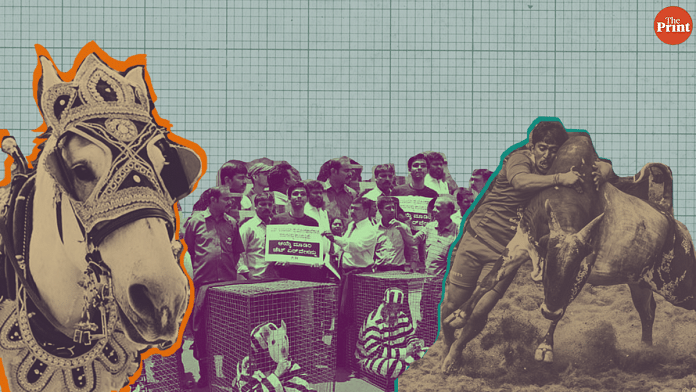PETA has slammed Priyanka Chopra and Nick Jonas for using horses and elephants at their wedding in Jodhpur. In the past, PETA has demanded a ban on Jallikattu, a switch to ‘vegan ghee’ on Janmashthami and a law to prevent animal slaughter before Bakrid.
ThePrint asks: Jallikattu, Priyanka’s wedding horses: Is PETA offending Indian culture or humanising it?
Groom arriving on a horse looked charming in 16th century, today it looks silly
 Gauri Maulekhi
Gauri Maulekhi
Animal rights campaigner
Healthy and strong cultures are built by evolving and remaining relevant with the changing times. Indian culture has discarded numerous old decaying traditions, which had become irrelevant in today’s day and age – sati, jauhar, dowry – and laws have been promulgated to protect society from falling back to old ways.
Abuse of animals has also crept into some of our traditions over time. Use of horses in Hindu marriage processions is one such abuse. Amid blaring drums, loudspeakers, animals are petrified and undergo unnecessary stress. This drill is repeated many times a day during the wedding season. Sometimes, mares are bleached and their open sores are covered with white paint to conceal their injuries due to mishandling; their pathetically protruding ribs are covered with colourful decorations. All this for what?
Several Indian organisations have asked for this abuse to stop. People for Animals, India’s largest organisation, headed by Maneka Gandhi, has been running sensitisation campaigns for many years against abuse of mares in baraats. Given the serious outbreak of the zoonotic disease called glanders in almost every Indian state, this is more in the interest of human health and common sense than animal welfare. Glanders has no cure and spreads from equines to humans.
As we evolve, cruelty to animals is now offensive, which may have been entertainment in the middle ages. A groom arriving on a horse may have been a charming sight in the 16th century, but today it appears ridiculous and silly. It is time we upgrade to more sensible customs and practices for a sustainable future.
PETA only strengthens suspicion that it acts selectively against Hindu practices
 Sanjay Dixit
Sanjay Dixit
Chairman, Jaipur Dialogues and author
The inability of English-educated, Western-funded elite to understand the underpinnings of Indian culture is resulting in absurd positions being taken by organisations like PETA. This naturally leads to conspiracy theories.
PETA is a Western fad. In Abrahamic cultures, such as in the West, animals do not possess a soul. They are supposed to be on this earth for the enjoyment of humans. In the Indian culture, the Supreme is thought to be present in every being, including in animals, plants and even stones. So animals are one’s own reflection. It is this basic dichotomy of understanding that makes all actions of PETA problematic. When PETA preaches against torture of living animals in the West, it is a utilitarian perspective. It is pointless to take the same approach in India, where ahimsa is a fundamental of all native cultures. Love for cows also comes from this.
PETA is not against the slaughter of animals, not even against the inhuman practice of ‘halal’, but is surprisingly upfront about animal discomfort/torture in Jallikattu or wedding horses. This is extreme hypocrisy.
Jallikattu as a cultural practice is essential for preventing indigenous breeds from going extinct. Wedding horses do not undergo any torture, at least not a fraction of what thoroughbred racing horses undergo. They keep a whole cultural practice and its supporting cast of band-players alive. PETA only strengthens the suspicion that it acts selectively against Hindu cultural practices.
Compassion for all living beings is the pillar on which our culture stands
 N.G. Jayasimha
N.G. Jayasimha
Managing director, Humane Society International
Non-violence is the bedrock of our Indian ethos, and love and compassion for all living creatures are the pillars on which our culture stands. This concept also finds resonance in Indian Constitution under Article 51A(g), which makes it a fundamental duty of all citizens to be compassionate to living beings.
The Supreme Court of India in Animal Welfare Board of India v. A. Nagaraja and Ors in 2014 laid down that every species has the right to be treated with compassion and dignity, free from unnecessary pain and suffering. It recognised five fundamental principles of animal welfare – (1) freedom from hunger, thirst and malnutrition; (2) freedom from fear and distress; (3) freedom from physical pain and discomfort; (4) freedom from pain, injury and disease; and (5) freedom to express normal patterns of behaviour.
Since this decision, animal protection organisations have approached courts to seek relief for animals on the grounds of violation of Article 51A(g) coupled with the fundamental right to life under Article 21.
The Supreme Court, being an arbiter of the Constitution, has provided constitutional protection to animals. This relief is seen by some as a threat to culture – these are the proponents who want to maintain status quo and portray culture as a subject that is set in stone. As society evolves, culture evolves too and such evolution is important for long-term sustainability of humanity.
Animal protection groups also face the challenge of low state capacity and often progress is hindered by political gridlock. Here, courts have played a key role in policy change and development.
PETA just wants to publicise India as a barbaric land to the world
 S. Muralidharan
S. Muralidharan
Founder, Redefining Animal Welfare
PETA started as a marketing company, with no relation to animal welfare. They were a kill shelter: They would pick stray dogs from the streets and keep them in their shelters and ask for donations. As long as the money would keep coming, the dogs would stay alive. Ultimately, most of the dogs would die.
But kill shelters aren’t sustainable, everlasting businesses. So they decided to become an animal welfare organisation. Their founder, Ingrid E. Newkirk, said that she would be happy if humans went extinct because animals wouldn’t suffer then. This is extremism.
Cruelty is present in every aspect of society. Eradicating cruelty is a long-term effort. But PETA is not genuinely interested in eradicating cruelty, they are merely interested in banning. They went after the Jallikattu festival a few years ago. They make videos and publicise India as a barbaric land to the rest of the world, like we still live in the stone-age.
How can travelling on elephants and horses be cruel? Their bodies are designed precisely for that purpose. Livestock is meant for eating, similarly, elephants are meant to be ridden.
Every animal has a commercial value. The minute you do away with that commercial value, they will become extinct, because there is no more money to be made. If you ban eating beef, cattle will become extinct.
Cruelty should be eradicated and that can be done only through education.
PETA will never be against horse racing because that’s an English sport
 Karthikeya Sivasenapathy
Karthikeya Sivasenapathy
Cattle rights and biodiversity activist
Animal welfare is a very broad subject. Sadly, farmers and others who work on ground with these animals are completely excluded from the conversation on animal welfare. Only the elitists spearhead these attacks, and are therefore removed from reality.
PETA is against the native culture of India. It is an organisation which works for foreign companies. PETA will never be against horse racing because it’s an English sport that uses English-bred horses. PETA doesn’t find this cruel, for some reason.
They repeatedly target the use of bullock-carts. They don’t realise that bulls are meant for carrying goods and transporting them.
PETA is constantly targeting South Asian cultures. I believe PETA should be eradicated from the Indian sub-continent. Their funding needs to be investigated. They say culture and religion should evolve. Sure, but some things remain fixed.
Even in the case of Jallikattu, we argue that the sport in itself is not cruel. Punish those who engage in cruelty, but don’t punish the sport. Jallikattu isn’t like the bull fight that happens in Spain. A sport like Jallikattu is cruelty-free, and this part of our culture must be preserved and protected.
Priyanka Chopra calls herself an animal lover but doesn’t care about how horses are treated at weddings
 Sanya Dhingra
Sanya Dhingra
Principal correspondent
We know terrible, unjust things happen in the name of culture. Women, children, Dalits are routinely stigmatised and even subjected to cruelty in its name. But, there are many who outrage when it comes to the abuse of human beings. There are, however, few, faint voices who outrage over the religious and cultural abuse of animals.
From goats being slaughtered for sacrifice to bulls being made to run amok even if that requires red chilli powder being rubbed into their eyes and genitalia — religion and culture give people a free pass to do whatever they like with animals. So much so that when a few people and groups like PETA speak out, most consider it a violation of our rights and entitlement as human beings.
Priyanka Chopra has been a self-avowed animal lover. Surely, she could have cared to know the plight of horses used at Hindu weddings before making her American husband ride one? (She had also been an anti-pollution campaigner until she decided to have a grand firework display at her wedding).
These horses are often kept in the most miserable conditions — routinely beaten by their drunk owners after loud weddings, during which they are made to stand in the middle of utter madness with the proud ladke-walas dancing away to loud (because how else do you show your superiority over the shy, meek ladki-walas?). Calling out this terrible cruelty is not a threat to Indian culture. Having a collective ego as fragile as a house of cards certainly is.
By Fatima Khan, journalist at ThePrint. You can follow her on twitter @khanthefatima.



